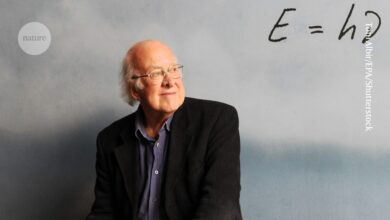
[ad_1]

French President Emmanuel Macron announced a set of reforms to France’s research system.Credit: Raphael Lafargue/Abaca Press via Alamy
The French government has announced a series of measures to overhaul the country’s organization of research, which President Emmanuel Macron claims will reduce bureaucracy and place science “at the heart of political decision-making”.
The reforms represent the biggest shake-up to France’s research system in about two decades, and are in line with proposals submitted by geophysicist Philippe Gillet at the request of research minister Sylvie Retailleau earlier this year. They include the creation of a Presidential Science Council, a group of 12 leading scientists that will meet several times a year and advise the president on research strategy and key issues facing scientists.
France’s research minister has a plan to shake up science
Macron presented the billion-euro plan to around 300 researchers, politicians and business leaders at the Élysée Palace in Paris on 7 December. “It is rare for a French president to speak about science at such length and in such detail,” says immunologist Alain Fischer, president of the French Academy of Sciences, based in Paris. “It is clear Macron has heeded scientists’ warnings about the problems in French research.”
Over the next 18 months, the country’s seven national research institutes will be transformed into ‘programme agencies’, each responsible for the strategy and coordination of all research on a particular theme, Macron said. At the moment, research in each discipline is scattered across various public institutions.
Under the reformed system, the Alternative Energies and Atomic Energy Commission will oversee all research on low-carbon energy technology, digital systems and infrastructure, the biomedical institute Inserm will be in charge of health research and the national research agency CNRS will oversee marine, climate and biodiversity research in collaboration with French Research Institute for Exploitation of the Sea and the Research Institute for Development.
More autonomy, less bureaucracy
Macron also promised further reforms that will improve the autonomy of universities, giving them oversight of university-based research groups that include researchers from the national agencies.
He also pledged measures to save researchers’ time, such as cutting the number of quality assessments, making grant-funding decisions within six months instead of a year and encouraging collaborations between universities and public research institutions “to increase fluidity”. Scientists have long complained about the bureaucratic burden in France, and say that previous attempts to simplify processes have gone nowhere.
Macron’s announcements were “positive overall”, Fischer says. “I am more enthusiastic about them than I had expected, and was surprised by their complexity.” He points out that there are gaps in the fields currently represented on the Presidential Science Council, including chemistry, Earth sciences and astrophysics.
How France ramped up its capacity to innovate
Fischer also welcomes the 18-month timescale. “It won’t be easy, in view of all the layers in the system, but Retailleau is competent and reliable, and I believe [that she] is capable of turning Macron’s words into deeds.”
Others have been critical of the plans. “Macron’s announcements were purely ideological, divorced from reality and based on a string of key words, such as ‘excellence’, ‘economic growth’ and ‘rampant bureaucracy’,” says Patrick Lemaire, a biologist at the University of Montpellier, France, who is president of an alliance of 74 French learned societies and outreach associations. “He is right about administrative burdens, but his ‘revolution’ of transforming research institutions such as the CNRS into mere funding bodies and transferring their scientific staff to universities will not solve the problem.”
The plan does not adequately address “the complexity of the funding labyrinth that researchers must navigate”, Lemaire adds. “Given the current state of the world, this is not the time to divert scientists from their work with ill-planned and controversial policies.”
Pierre Rochette, geophysics researcher at Aix-Marseille University in France, is glad that the government has finally recognized malaise among researchers. But he adds that institutes such as the CNRS face more immediate issues, such as overly complicated systems and dysfunctional software, that will not be solved by high-level reforms. “I have no idea what the new role of research agencies will do to resolve the huge problems confronting the CNRS,” he says.
Source link






